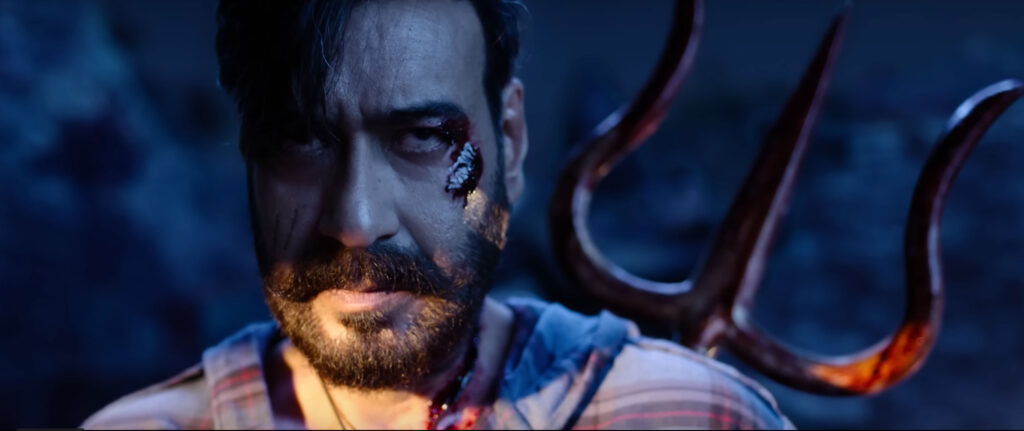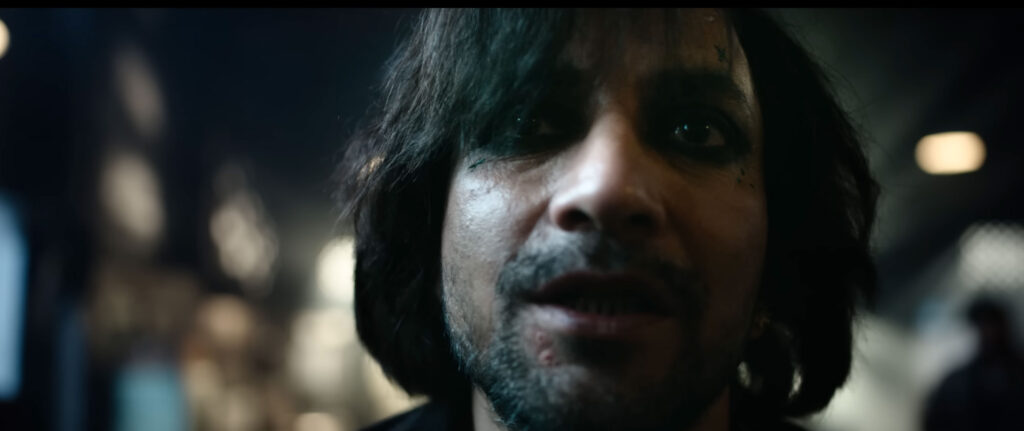March 30, 2023
by Carla Hay

Directed by Ajay Devgn
Hindi with subtitles
Culture Representation: Taking place in India, the action film “Bholaa” (a remake of 2019’s “Kaithi”) features an all-Indian cast of characters representing the working-class, middle-class and criminal underground.
Culture Clash: A recently released prisoner agrees to help police fight and capture a drug cartel, in exchange for reuniting with his 10-year-old daughter, who has been placed in an orphanage.
Culture Audience: “Bholaa” will appeal primarily to people who fans of the movie’s headliners and who like watching mindless action movies that are more than two hours long.

“Bholaa” takes all the worst elements of bloated action flicks and puts them into this overly long, messy and idiotic film. The police in this movie are so stupid, they leave their police station unlocked and unstaffed while prisoners are inside. This time-wasting junk movie (which clocks in at a mind-numbing 144 minutes) includes every vacuous cliché of movies about cops versus criminals—a rebellious “hero,” who the unrealistic ability to survive violence that would kill most people; gravity-defying and unrealistic fight scenes; a “female in peril” subplot; and formulaic double-crossing and betrayals.
“Bholaa” is also one of the most worthless movies that you could ever seen in 3-D, since the 3-D format adds nothing meaningful to the movie’s action and visuals. Viewers who watch “Bholaa” in 3-D might forget they’re watching a 3-D movie. “Bholaa” was also released on some IMAX screens, which just means that viewers can see on a bigger screen how horrible “Bholaa” is on every level.
Directed by and starring Ajay Devgn, “Bholaa” is a remake of the 2019 Tamil language film “Kaithi.” Six people are credited with writing the “Bholaa” screenplay: Govind Bhana, Shridhar Dubey, Lokesh Kanagaraj, Aamil Keeyan Khan, Sandeep Kewlani and Ankush Singh. It’s never a good sign when so many people have screenwriter credits for one screenplay, because it’s usually a sign of “too many cooks in the kitchen” syndrome. In the case of “Bholaa,” these screenwriters cooked up a screenplay that should have been dumped in the garbage.
“Bholaa” is yet another action movie about a roguish protagonist who has to find a way to save a loved one while battling enemies in phony-looking fight scenes. Bholaa (played by Devgn) is a former gang leader who was sentenced to prison for his crimes, shortly after his doctor wife Swara (played by Amala Paul) was murdered by a rival gang leader. In the beginning of “Bholaa,” he is let out of prison, after serving a 10-year sentence.
Bholaa’s backstory is told as a flashback about midway through the movie, which has substandard film editing and makes the entire movie very muddled. The irony of Bholaa’s imprisonment was that he had given up his life of crime before he married Swara, who did not approve of his criminal lifestyle. However, Bholaa’s nefarious past caught up to him. Shortly before Swara was murdered, she had given birth to a daughter named Jyoti.
Because there were no other family members who could have taken custody of Jyoti after Bholaa was sentenced to prison, Jyoti was put in an orphanage. Now 10 years old, Jyoti (played by Hirva Trivedi) lives at the Saraswati Orphanage in Lucknow, India. She hears that someone has been trying to contact her, but the movie contrives a number of scenarios (some more ridiculous than others) for why Bholaa can’t reach Jyoti over the phone.
The most ludicrous-looking scenario shows Bholaa calling Jyoti on the orphanage phone while he’s driving a bus full of police officers, but then a Molotov cocktail is thrown through the front windshield, thereby cutting off the phone call before Bholaa gets a chance to have a conversation with Jyoti. And the movie expects viewers to believe that Bholaa has the phone number for Saraswati Orphanage, but he can’t figure out a way to find this orphanage. He also doesn’t know how to identify Jyoti when he sees a photo of children at the orphanage, even though her name hasn’t changed, and he could use the Internet or other resources to find out what she looks like.
There’s some nonsense about Bholaa putting ash on his forehead as a ritual, to signify the ashes of his slain foes. Bholaa also has a trident that is used for gruesome stabbings. All of these superficial gimmicks could have been left out of the movie and it still would’ve made no difference to this terribly written story and what happens in the end.
Before he can reunite with Jyoti, Bholaa finds out that he is being sought after by Inspector Diana Joseph (played by Tabu), who leads a team that has confiscated a large stash of cocaine worth ₹1 billion that was going to be trafficked by the notorious Sikka Gang. Diana is determined to capture the Sikka Gang, including its co-leaders: cunning Nithari (played by Vineet Kumar) and his loose-cannon younger brother Ashwathama, nicknamed Ashu (played by Deepak Dobriyal), who wears heavy eyeliner and frequently snorts cocaine. Diana wants Bholaa to help her capture this gang, as part of Bholaa’s parole.
During this cocaine confiscation, Diana and some of her fellow police officers were in a wild car chase and gun shootout on a highway, where Diana was firing a gun from a police car driving backwards. It’s the movie’s opening scene. Diana gets wounded in her left arm, and wears a sling throughout the rest of the movie. But her injured arm is often “forgotten” in fight scenes where Diana moves her left arm as if she has no injuries at all. It’s just more of the sloppy filmmaking of “Bholaa” on display.
Nithari ends up in a jail cell at the police station with other prisoners in the same cell. There’s a long segment of the movie where Diana and her police force leave the station unattended and unlocked so they can go looking for the Sikka Gang. Yes, that’s how foolish this movie is. A group of college students (three males and one female) are visiting a prisoner and are confused that there are no police at this police station. A prisoner asks one of the students to get the jail cell key that’s hanging on a nearby wall.
All of sudden, a 55-year-old constable from another precinct shows up and stops the student from handing over the key. The constable’s name is Angad Yadav (played by Sanjay Mishra), and he becomes a liaison over the phone for Diana in dealing with the Sikka Gang, while he mans the police station all by himself. Does any of this tripe make sense to you? It shouldn’t, because “Bholaa” is hell-bent on being as illogical as possible.
On the outside, Ashwathama finds out there’s an unidentified informant in the Sikka Gang who has been leaking important Skikka Gang information to the police. Ashwathama decides the best way to find the informant would be to kidnap Diana and torture the information out of her. And so, there’s another long stretch of the movie were the Sikka Gang goes after Diana, whom Ashwathama insists should be captured alive. Ashwathama tells his gang members that he doesn’t care if anyone else they fight ends up dying.
There are three other police officers who play roles in this silly story. Devraj Subramaniam (played by Gajraj Rao) and Deep Singh (played by Lokesh Mittal) are both corrupt, while Kadchi (played by Amir Khan) is Diana’s buffoonish sidekick. Kadchi is more comfortable being a office guy who looks at statistics rather than being in the middle of violent fights.
Almost every imaginable act of violence is shown in “Bholaa.” And it all becomes empty and monotonous after a while, especially after multiple scenes where Bholaa takes and defeats several men at the same time. And in typical fashion for action schlock that’s all style and no substance, “Bholaa” has a bombastic and blaring soundtrack music, as if the “Bholaa” filmmakers think that loud music is supposed to make all the stupidity better. There’s absolutely no suspense in “Bholaa,” which just regurgitates the same type of dreck that can be found in dozens of other big-budget, low-quality action movies.
Panorama Studios and PVR Pictures released “Bholaa” in select U.S. cinemas and in India on March 30, 2023.

